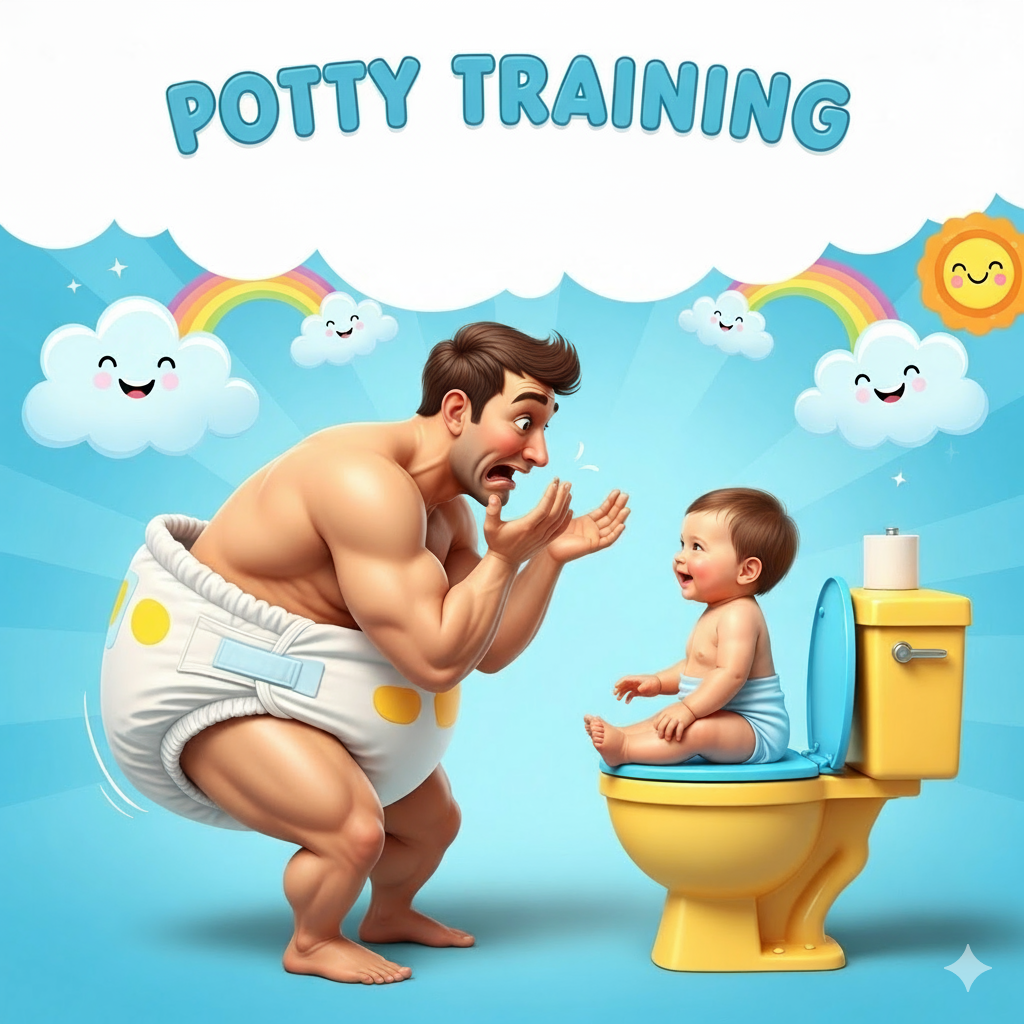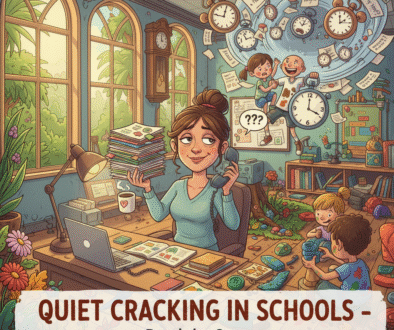
The Great Diaper Escape.
When to Say Goodbye and Sit on the Throne
Diapers. Cozy, convenient, and sneaky little creatures that make life easier — for a while. But when it comes to potty training toddlers, too much comfort can slow down independence. Too soft, too forgiving, and suddenly you realize you’re babysitting both the child and the diaper itself. That little trap of convenience is the enemy, and eventually, it has to go.
When Is the Right Time for Potty Training Toddlers?
There’s no exact chart or birthday for starting potty training toddlers. The right time is when a child’s body is strong enough to sit upright, balance, and start showing little signals — wiggles, pauses, or the famous “potty dance.” Readiness is physical, mental, and rhythm-based. That’s your cue. Not trends, not charts, not Auntie’s gossip. The body tells you.
Preschool Reality Check: Potty Training Toddlers in the Wild
Now let’s picture a preschool classroom: a buzzing little universe of Lego engineers, crayon philosophers, and sandcastle politicians. Nobody has time for the toilet. Not because they’re shy, but because they’re busy changing the world. By the time the urge catches up, it’s usually too late.
The teacher’s nose twitches. A sudden aroma wafts through the air like the plot twist in a crime thriller. She scans the room like Sherlock Holmes with a PhD in preschool. Someone, somewhere, has delivered.
Sometimes the guilty one is obvious: “Teacher, I made a surprise!” they announce proudly, like they’ve just baked a cake. Other times, it’s stealth mode — no confession, just the unmistakable evidence. The rest of the class? Half clap, half scatter, one child pinches their nose dramatically, and another tries to join the movement.
Welcome to potty training in the wild.
The Teacher’s Mantra – Water? Toilet? Toilet? Water?
This is why preschool teachers sound like broken records: “Water? Toilet? Toilet? Water?” Every hour. Every few steps. Every transition. They chant it like monks, because they know children forget. At home, you need the same strategy: reminders, consistency, and a little humor.
Routine is the secret. Toilet after waking up. Toilet before bed. Toilet before leaving the house. In two weeks, the body starts to flow with the rhythm. Will there be accidents? Oh yes. Sheets will be washed, pants will be rinsed, carpets will hold memories. But the faster you set the routine, the faster the mess clears and independence blooms.
Comfort Is the Enemy: Modern Diapers vs. Cloth
Here’s the problem: modern diapers are too good. They hide discomfort, absorb like magic, and trick everyone into thinking time isn’t ticking. In the old days, cloth diapers screamed “I’m wet!” instantly. Parents rushed, kids learned, and progress happened. Today, comfort delays everything. The truth? Easier for parents now often means harder for the child later.
That’s why in my house, diapers were for travel, cinema, or rare social emergencies. At home? No. Skin breathes, signals come, kids learn fast. The moment they could sit, I made them sit on the toilet (yes, carefully supported, no accidents). They learned quickly: this is the throne, this is the place. No glorification. That means no fancy potties that sing or play, no toys, no bottles to distract, no turning it into entertainment. It’s just: sit, finish, done. The toilet is a functional, natural, healthy place. Long sitting is not healthy, so don’t stretch it, but don’t rush them either.
Here’s a tip many parents miss: model behavior. Announce when you need to go — “Mama needs to pee, I’m going to the toilet.” Let your child watch, observe, learn. Ask gently: “Do you need to sit? Let’s drop the yukky if it’s ready.” This teaches awareness, independence, and normalizes the whole process without pressure. They see it, they learn it, they mimic it — it’s as natural as washing hands after lunch.
The Parent’s Role
And here’s the truth nobody likes to say out loud: potty training is not the school’s job. It’s yours. Parents set the tone; teachers support. If you send your child to preschool without even starting the journey, you’re not just outsourcing learning — you’re outsourcing the smell.
Children thrive on consistency. Home and school must sing the same song. If at home the diaper rules, and at school the toilet is expected, the child is stuck in confusion. Regulate the day, set the rhythm, and don’t glorify the poop moment. It’s natural. It’s healthy. It’s done.
Final Truth
Potty training isn’t punishment. It’s growth, routine, and freedom. Yes, there will be accidents. Yes, there will be sheets to change at 2 AM. But isn’t that better than three more years of carrying a personal waste-management system in your handbag?
Start when your child’s body is ready. Support with humor and routine. Accept the mishaps. Celebrate independence. And remember — every parent in history has walked this road, laughed at the same accidents, and survived to tell the tale.
Potty training: the most hilarious, smelly, and liberating chapter of early childhood.


